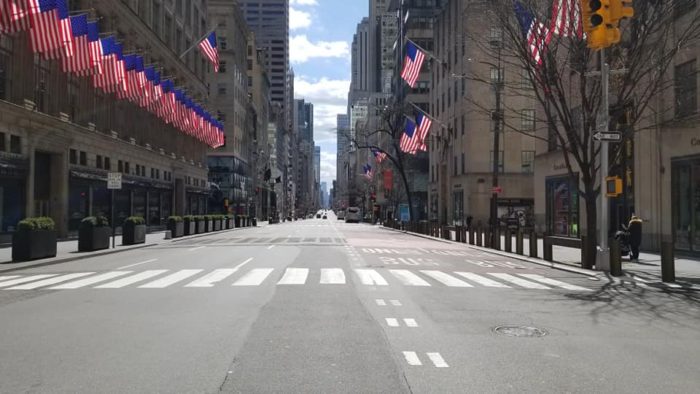The IWEC Foundation today is releasing the results of a COVID-19 survey taken by fifty women from around the globe who are business owners in the IWEC network
50 CEOs / 18 countries / 27 industry sectors & service companies
photo: 5th Avenue, NYC by Nancy Ploeger
A survey of 50 international women business owners in the IWEC network was conducted, bringing insight into COVID-19 effects around the globe. IWEC’s network includes women-owned businesses that range in annual revenue from $1.5 million to over $2 billion. The industries ranged from manufacturing to food and beverage to professional services, and from technology to construction to travel & tourism to name a few.
Across the globe and across industries, the virus has affected every business, as is expected. Most businesses have been adversely impacted, while a few others have actually needed to ramp up to meet increased demands. Business owners are forced to think outside-of-the-box, while trying to keep employees working (if possible) and paying their suppliers with little-to-no income coming into the businesses. Below are a few top-line findings:
70% of the respondents are greatly concerned with the negative impact of this pandemic.
Only 20% have had to lay off a significant number of employees.
65% have lost customers, while 65% have also had their supply chains interrupted.
63% expect decreases in overall revenue.
52% of the participants are implementing cost containment initiatives and 49% are changing company financing plans.
Overall, survey participants are concerned not only with the immediate impacts of government requirements and business conditions, but also with defining the ‘new normal.’. How long will it take to develop a vaccine? What will people’s buying habits be in the future? How will international trade be impacted with supply chain and port issues? Many believe the economy and recovery will not begin until 2021.
The following are a few of the women and their responses:
Monica Schimenes de Oliviera—CEO, MCM Brand Group from Brazil—states “My business depends on having people together in the same place – events. I can’t do anything about it right now, because all events are canceled, so we’re creating virtual experiences, home events, designing branded gifts for end customers, working more on digital communication and finding ways to sell things we didn’t sell before to try to have some revenue, because today our revenue has stopped completely.”
Chandrika Chunital—CEO, Capital World Trading in Shanghai, China—oversees a garment manufacturing plant and deals in textile trading. She is negotiating with suppliers to make partial payments now, with balances due within two months. Customers are asking her to delay deliveries, which is holding up production and raw material consumption, blocking banking support and cash flow. . To counteract, she is scrambling to find more local orders from industries that she has not approached previously. “If I am unable to attract the business, I will give annual holidays to my workers during this time.”
And in Bahrain, Dr. Lamya Mohamed—CEO, Dr. Lamya’s Specialized Dental Centers—faces challenges in medical supply shortages and an inability to see patients. Even as the lockdowns are lifted, she is concerned that patients will be too afraid to come to the dental offices for treatment.
Meanwhile, also in Bahrain, Ahlam Janahi—CEO, My Bakery—has seen increases in orders and production. She is maintaining close contact with all workers to ensure safety and is challenged with uneven production timing due primarily to erratic deliveries of raw materials from suppliers.
In South Africa, where the lockdowns were stringent even as incidence rates were lower than in most countries, Susan Louw—CEO, Chocolate Lace CC—has had to lay off 40% of her staff from her retail and manufacturing company. Her supply chain has decreased by 100%, as have customer orders. “? Even if the COVID-19 were to end today and everything could open up normally, it would take us 3 – 6 months to get back up and running effectively and efficiently.”
Also in South Africa, Shona Alexander—Shonaquip Social Enterprise, which is focused on creating and distributing products for the disabled—is concerned that there will be less concern for those with disabilities. 30% of her employees are disabled and 100% of her customers are disabled. She fears a redirection of funding and support for the community.
And from Afghanistan, Afsana Rahimi—CEO, Shayar Media Services—notes that “We are facing many problems in our country in addition to the virus. Our customers’ places of business are closed and no one is buying media services at this time. Our political situation is not good, there are security issues and many other challenges facing us. The virus has just made it worse for us.”
Finally, Vigdis Eriksen—CEO, Eriksen Translations here in the U.S.—identifies “the decline of society and human suffering at all levels” as one of her main concerns.
To view a PowerPoint report with all survey findings and additional quotes, please visit:



